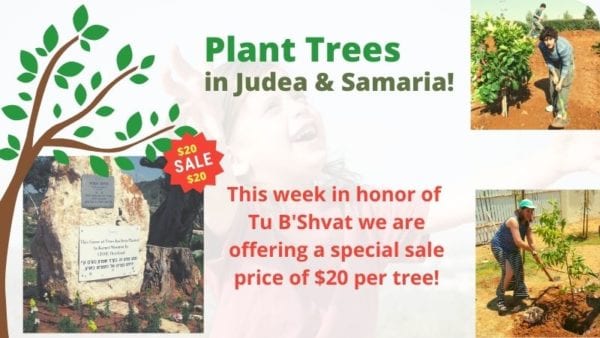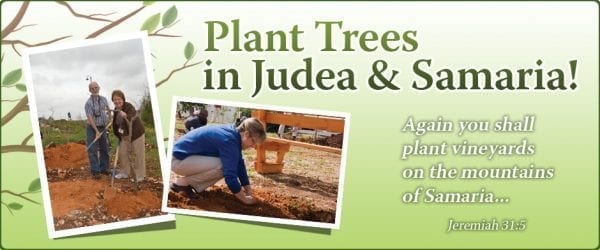Rain and Trees in Israel!
For the past few weeks, we have had loads of rain – drizzles, storms, thunder and lightning. Lots and lots of rain! In fact, Karnei Shomron was noted on one weather report as having the largest rainfall of the country. In Israel, we can’t afford to take rainfall for granted, so there is excited anticipation in the air, as everyone waits to see the land turn a glorious green.
Next week is Tu B’Shvat, the “New Year of the Trees”. It is day where we celebrate the fruit of our trees and children and adults alike take the time on that day to go out and plant trees. Israel is the only country in the world that had more trees at the end of the 20th century than it did at the beginning, and that is because planting trees has been a key Zionist enterprise, long before it became ecologically popular.
A few years ago, my friend and neighbor Shira Schwartz, wrote a lovely piece about Tu B’Shvat and I would like to share it with you. And as you think of us celebrating in Israel, go out and buy a fruit grown in Israel and enjoy it!
Reflections on Tu B’Shvat
By Shira Schwartz
When I lived in America, Tu B’Shvat was a poor imitation of what it is really meant to be. Schools used to give out little bags filled with dried fruits, and in Arts and Crafts we would make little trees out of colored paper, creating mini almond blossoms out of cotton balls dotted with lipstick. But that’s it. I guess it’s hard to feel the celebration of planting and growth in the Land of Israel, when you’re sitting in America. Somehow, other Jewish holidays are connected to our history, and their laws and traditions are not only viable, but still very meaningful, even abroad. But Tu B’Shvat celebrates the land.
And now I’m living in the land. And I thank G-d every day for that.
Here, on Tu B’Shvat, you feel the holiday. It is customary to eat the fruits, nuts and foods that are made from species that grow specifically in Israel, like figs, dates, almonds and carob. Every city, every municipality, every community, has its own plantings, bringing spots of growth and color to schools, synagogues and streets. Youth groups travel to forests, to barren areas along the highways, to newly built outposts, and plant young seedlings, sinking their sweet young hands into the rich soil, perhaps not even realizing how momentous this simple act is. The little children come home from kindergarten, proudly carrying little sticker-and-crayon-decorated pots of planted bulbs, seriously spouting instructions for their care. This year my grandson Amit explained to me how the almond tree is the first to begin to flower and to have its sap rise within the tree. And he explains how Tu B’Shvat falls just at the right time. I heard this from each of my children at the same age and I’m still not bored with the next generation. I still love living in the land where I can walk the streets and see the pink almond blossoms coming into bloom right when they are supposed to!
In Leviticus (19:23) we read, “When you will come into the Land of Israel, you will plant all fruit trees.” After years of wandering through the wilderness, one of the first things the People of Israel are commanded to do, right alongside setting up a system of government and strategizing the conquering of the land, is planting trees. The Bible presents the Jewish People with a wonderfully successful way of settling the land and making a connection with the land. Over a hundred years ago, before there was even a Jewish State, the Jewish National Fund took upon itself the buying of land in Israel, and the first Zionist act that they did was to encourage the planting of trees. The first thing! Just like in the days of the Bible. It was very emotionally satisfying for lovers of Israel from all over the world to have something concrete to do to show support– to “buy” a tree and have it planted in Israel. I remember, as a child in America, being very proud of the certificate I received from JNF, childishly picturing “my” tree, standing in a forest, labeled with my name.
I see the excitement and appreciate the generosity of CFOIC Heartland groups, when they come to plant fruit trees in our communities. And I understand their delight when they come back a year later and see the fruits of their labor!
The Bible is full of laws and customs connected to trees, encouraging us to value them, to cherish them. When fruit trees are planted, for three full years their fruits are forbidden to us. They may not be eaten (Leviticus 19:23-24). We see the bounty bursting forth on the vines and we are cautioned: “Beware lest you say in your heart, ‘My power and the strength of my hands have produced this wealth for me. But remember the Lord your G-d, for it is he who gives you the ability to produce wealth.” (Deuteronomy 8:17-18)
There is no bigger thrill than sending my boys out to the yard with a bag, to fill it with fruits of our own orange and tangerine trees. Even better is when I peek outside and see Netanel and Elitzur picking oranges, then peeling them right there and biting into the sun- ripened juiciness, spitting the seeds into our rich earth.
It is not so simple to cut down fruit trees. Once fruit trees have taken root, they are a part of the land. Many houses, even public parks have been built around existing trees, so as not to uproot them.
I get a real kick out of the fact that we have our own fruit trees growing in our backyard, and when the first blossoms of spring bloom, we gather the children and together recite a blessing, thanking G-d for the fruit of His trees and for providing His people with the enjoyment and pleasure of His fruits. It is meaningful to leave, for a moment, our offices, our classrooms, our homes, and go out to our gardens, our fields, and thank G-d for this sign of renewal, praise him for this sign of the continuation of His creation.
There is a classic tale from the Talmud, of Honi, a righteous man, who was out walking when he came upon an old man planting a carob tree. Honi asked the man, “How long will it take for this tree to bear fruit?” The man replied, “Seventy years.” Honi then asked the man, “And do you think you will live another seventy years and eat the fruit of this tree?” The man answered, “Perhaps not. However, when I was born into this world, I found many carob trees planted by my father and grandfather. Just as they planted trees for me, I am planting trees for my children and grandchildren so they will be able to eat the fruit of these trees.” Trees help us focus on the next generation… on a future.
A Talmudic sage once said, “Anytime our wisdom exceeds our good deeds, to what are we compared? — To a tree whose branches are numerous but whose roots are few; then the wind comes and uproots it and turns it upside down…. But when our good deeds exceed our wisdom, to what are we compared? — To a tree whose branches are few but whose roots are numerous; even if all the winds of the world were to come and blow against it, they could not budge it from its place…”
May the people of Israel keep on growing and flourishing and may they be privileged to continue putting down roots in the Promised Land. And may we see the fulfillment of the prophecy in Ezekiel (34:27), “And the tree of the field shall yield her fruit, and the earth shall yield her increase, and they shall be safe in their land.”
Click here to plant your tree in Samaria on this Tu B’Shvat – the Jewish holiday for trees!


